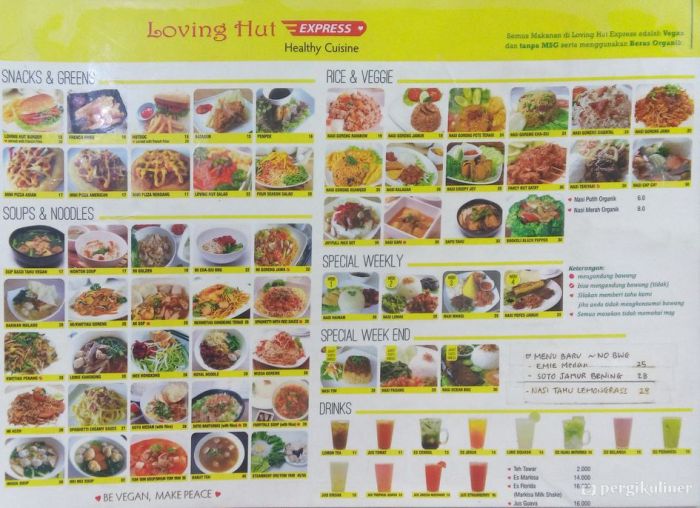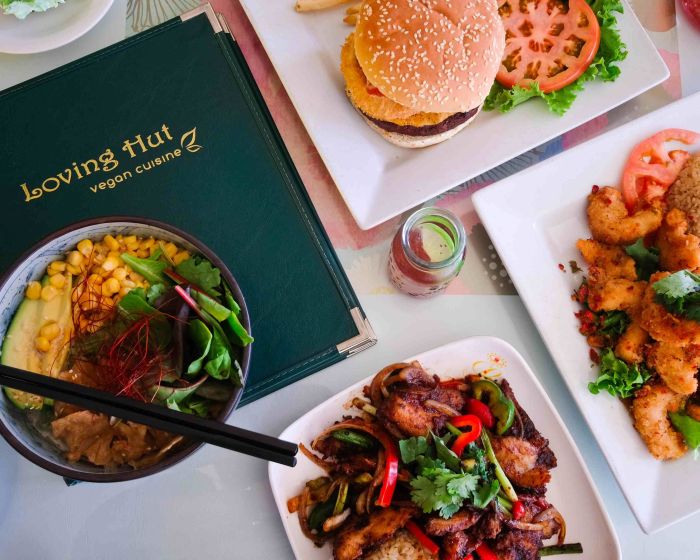Ingredient Analysis and Sourcing

Loving hut nutrition facts – Loving Hut’s commitment to plant-based cuisine extends beyond simply offering delicious alternatives; it involves a meticulous approach to ingredient selection and sourcing, directly impacting the nutritional profile and overall quality of their dishes. This interview delves into the specifics of their ingredient choices and the rationale behind them.
The foundation of Loving Hut’s menu lies in a diverse range of plant-based proteins, vegetables, grains, and legumes. Understanding the sourcing and quality of these ingredients is key to appreciating the nutritional benefits they provide.
Looking at Loving Hut nutrition facts, it’s clear they prioritize plant-based options. For a comparison of similar healthy choices, you might want to check out the kashi go nutrition facts to see how their nutritional profiles differ. Ultimately, both Loving Hut and Kashi offer options for those seeking nutritious and convenient meals, but their specific nutritional content varies widely depending on the item selected.
Main Ingredients and Their Sources, Loving hut nutrition facts
Loving Hut utilizes a wide variety of ingredients, prioritizing locally sourced produce whenever possible to minimize environmental impact and ensure freshness. Common protein sources include tofu, tempeh, seitan, and various types of beans and lentils. These are often sourced from reputable suppliers committed to sustainable and ethical farming practices. Vegetables are typically seasonal and sourced from local farms and distributors, ensuring optimal nutrient content.
Grains like rice, quinoa, and various types of noodles form the base of many dishes, selected for their nutritional value and digestibility.
Nutritional Value and Impact of Sourcing
The nutritional value of Loving Hut’s dishes is significantly influenced by the quality and origin of their ingredients. Locally sourced, organically grown produce generally contains higher levels of vitamins, minerals, and antioxidants compared to conventionally grown counterparts. Similarly, the selection of high-quality plant-based proteins ensures adequate intake of essential amino acids, fiber, and other vital nutrients. Sustainable sourcing practices further contribute to the overall nutritional value by reducing the potential for pesticide residues and other harmful contaminants.
For example, choosing tofu made from non-GMO soybeans ensures a higher quality protein source free from potential genetically modified organism concerns.
Benefits of Plant-Based Ingredients Compared to Animal-Based Alternatives
The shift towards plant-based ingredients offers numerous nutritional advantages over animal-based alternatives. Plant-based diets are often associated with lower saturated fat and cholesterol levels, contributing to improved cardiovascular health. They are typically richer in fiber, promoting healthy digestion and gut microbiota. Furthermore, plant-based foods are often excellent sources of vitamins, minerals, and antioxidants, playing a crucial role in disease prevention and overall well-being.
For instance, replacing red meat with plant-based protein sources like lentils can significantly reduce the risk of heart disease, as demonstrated by numerous epidemiological studies. The lower environmental impact associated with plant-based agriculture is also a significant benefit.
Allergen Information and Dietary Restrictions: Loving Hut Nutrition Facts

Understanding allergen information and dietary restrictions is crucial for ensuring the safety and satisfaction of all Loving Hut customers. We are committed to providing clear and accurate information to help individuals make informed choices about their meals. This section details common allergens present in our menu and explains how we accommodate various dietary needs.
Common Allergens in Loving Hut Menu Items
This table Artikels common allergens found in some of our dishes. It’s important to note that while we take every precaution, cross-contamination may occur in a shared kitchen environment. Always inform your server of any allergies or sensitivities before ordering.
| Allergen | Dishes Containing Allergen (Examples) |
|---|---|
| Soy | Many stir-fries, sauces, tofu dishes, tempeh dishes |
| Wheat/Gluten | Certain noodle dishes, bread, some sauces (may contain soy sauce or wheat-based thickeners) |
| Nuts (peanuts, tree nuts) | Some desserts (check with server), certain sauces (check with server) |
| Dairy | While most dishes are dairy-free, some desserts or sauces may contain dairy-derived ingredients (check with server). |
| Sesame | Some sauces, noodle dishes (check with server) |
| Mustard | Certain sauces (check with server) |
| Shellfish | While Loving Hut is vegan, cross-contamination is always a possibility, so please inform your server of any allergies. |
Catering to Dietary Restrictions
Loving Hut is dedicated to accommodating various dietary restrictions. We understand the importance of providing delicious and safe options for individuals with specific needs. Our staff is trained to assist customers in making informed choices and modifying dishes to meet their requirements.
Examples of Menu Modifications
Many of our dishes can be adapted to meet specific dietary needs. For instance, a customer requesting a gluten-free meal could substitute rice noodles for wheat noodles in a stir-fry. If a customer is soy-free, we can often substitute soy-based sauces with tamari or coconut aminos (always double-check with your server for specific ingredient information). For nut allergies, we will gladly prepare dishes without nuts and avoid cross-contamination as much as possible.
It’s vital to communicate your dietary needs clearly to your server to ensure accurate preparation. Remember that while we make every effort to accommodate dietary restrictions, cross-contamination may still be a possibility.
Answers to Common Questions
What are the best menu items for weight management at Loving Hut?
Dishes lower in calorie density and higher in fiber, such as salads and noodle soups, are generally better choices for weight management. Always check serving sizes.
Does Loving Hut offer gluten-free options?
Yes, many Loving Hut locations offer gluten-free options. It’s best to check with your local restaurant for specifics and to confirm ingredients.
Are Loving Hut ingredients locally sourced?
Sourcing varies by location. Contact your local Loving Hut for information on their specific sourcing practices.
How can I find out about seasonal menu items?
Check the Loving Hut website or your local restaurant’s menu for seasonal specials and ingredient updates.
